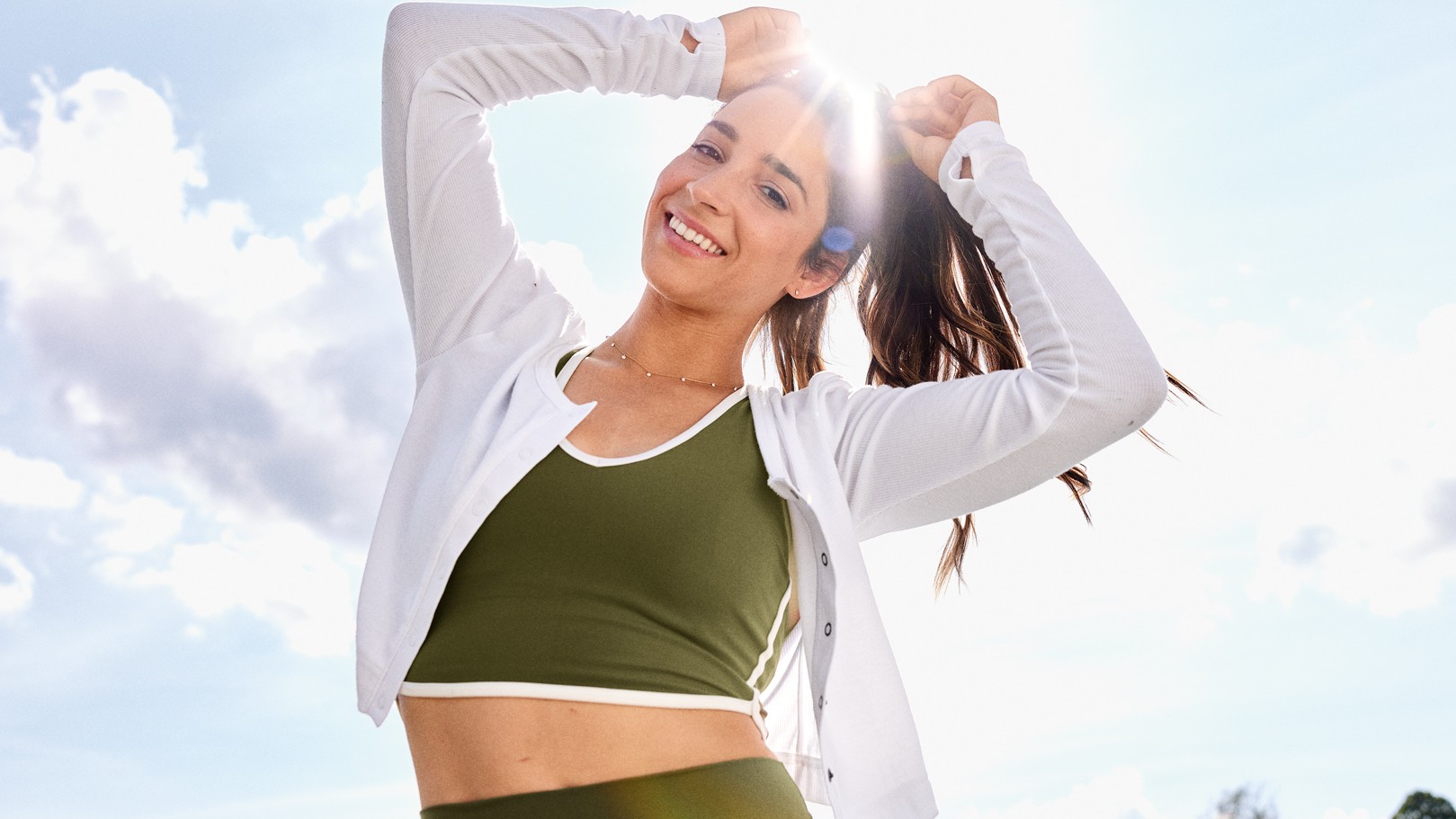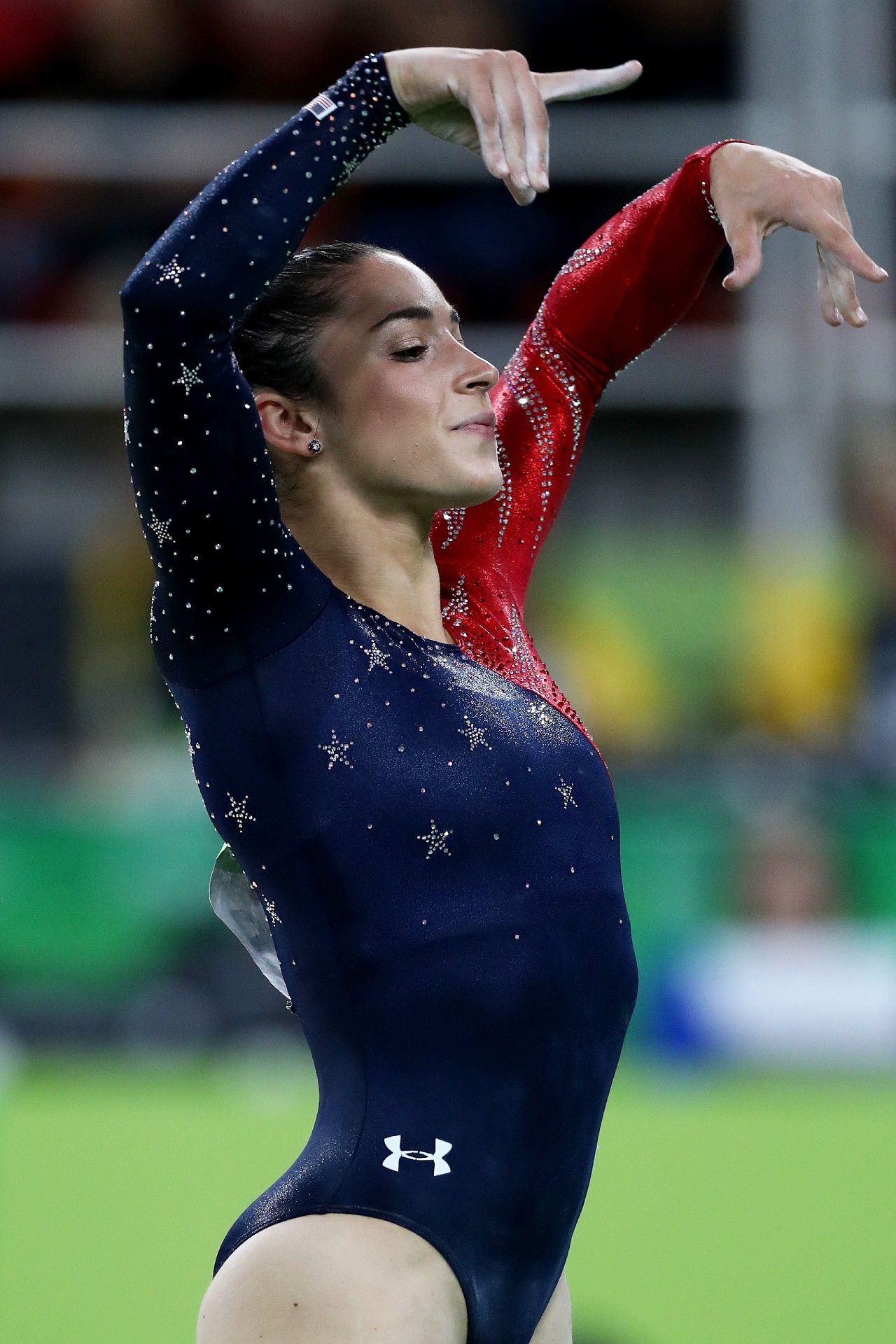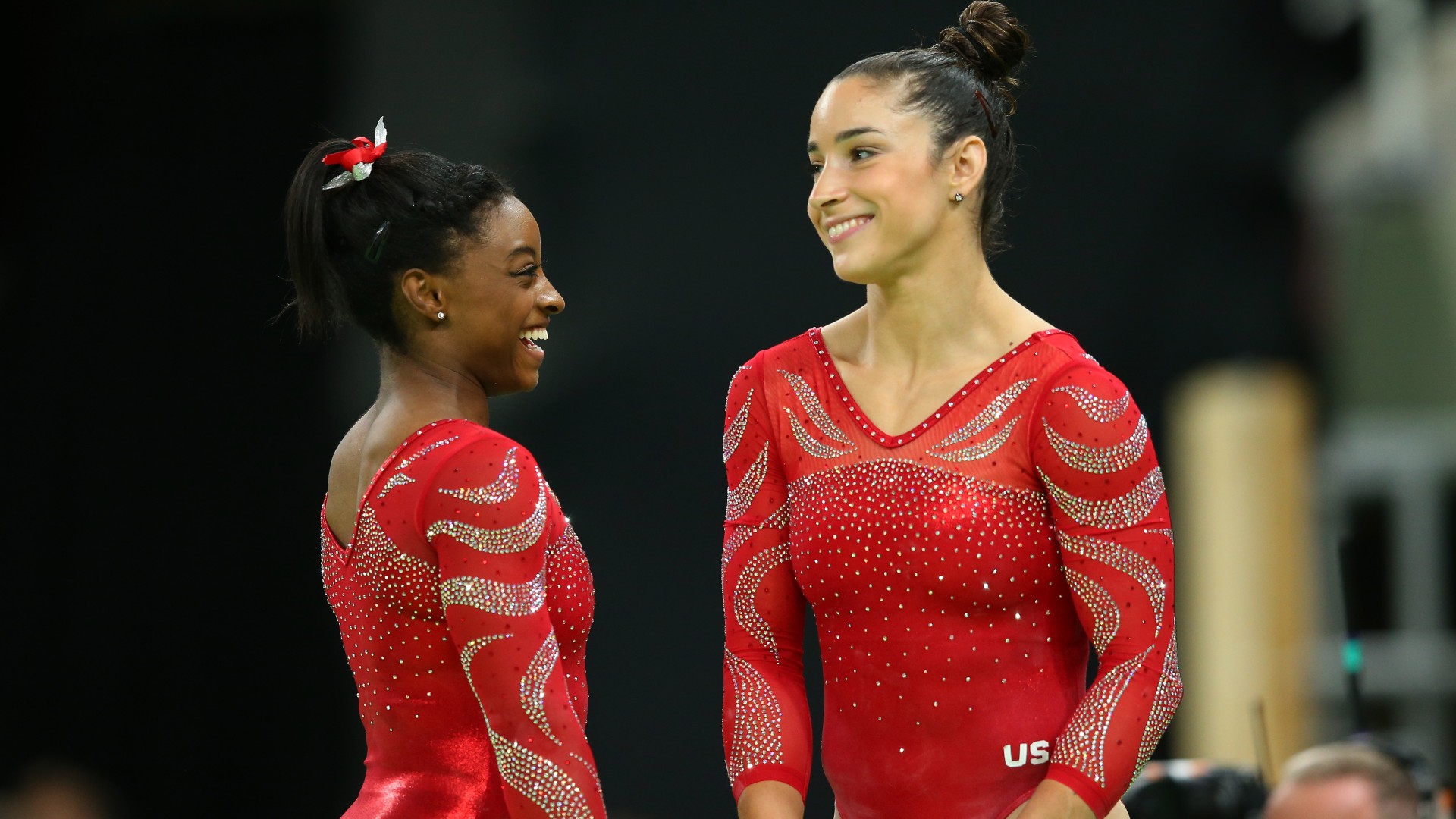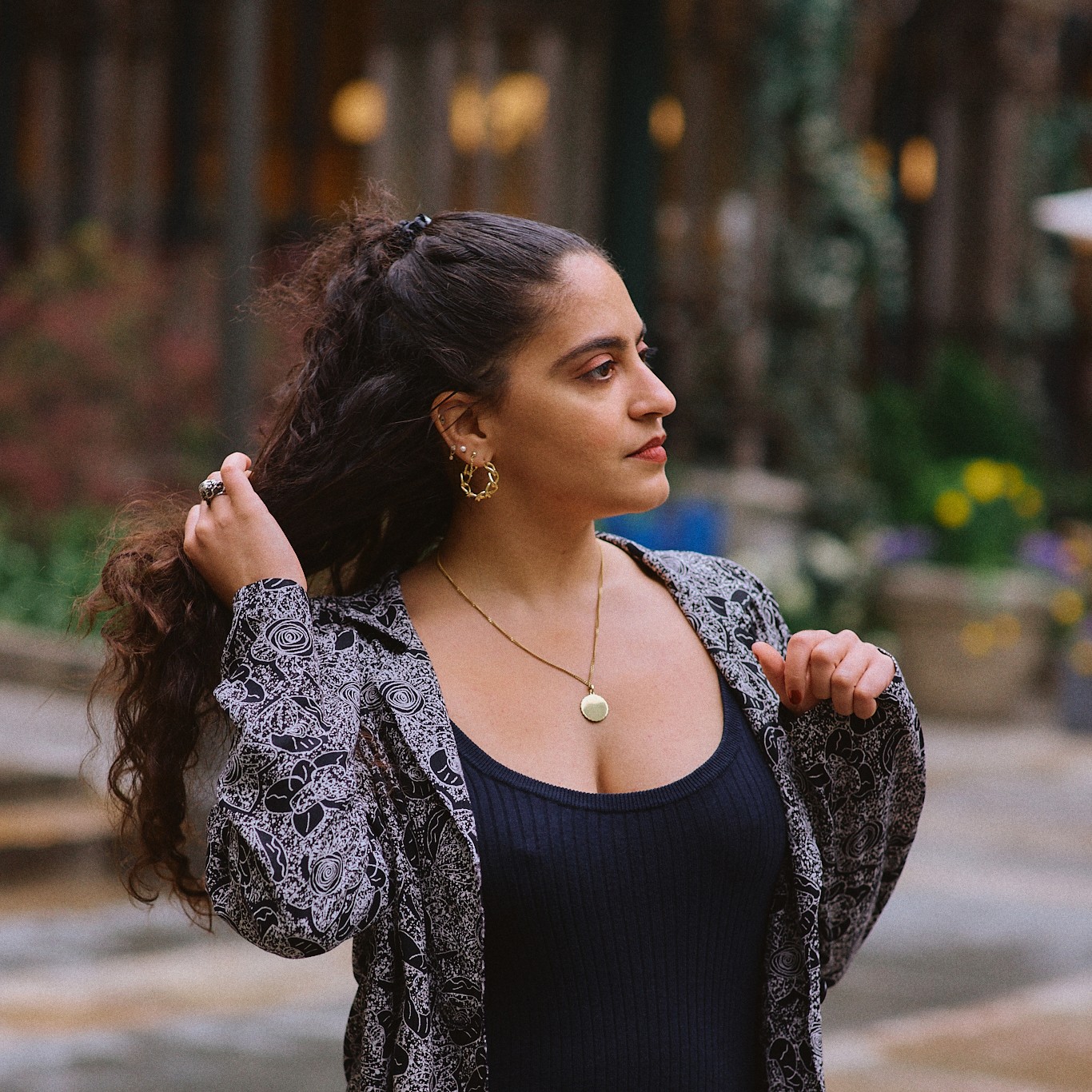Aly Raisman on Body Positivity and Detoxing From Social Media
The athlete opens up about overcoming insecurities and creating safe spaces on the internet.


It would be easy to believe that Aly Raisman―a gold medalist with a whopping 2.1 million Instagram followers―might be immune to the insecurity that social media breeds. (Studies have shown apps like Instagram can set unrealistic expectations about body image and exacerbate mental health issues like body dysmorphia and low self esteem.) But the 27-year-old athlete maintains she hasn't been spared these challenges.
In the newest incarnation of her longstanding partnership with clothing brand Aerie, Raisman will be helping others overcome those obstacles that she's all too familiar with. Through a series of PSAs shared on Aerie's Instagram as well as her own starting March 15, Raisman will deliver unfiltered advice about staying positive in spite of social media's powerful influence and "paying attention to what we are consuming on a daily basis."
This focus on the importance of compassion and positive self-talk as methods of self-care has long been championed by Raisman, who advocated for people to focus on their mental health throughout the pandemic. She also spoke out in support of Simone Biles' decision to pull out of the 2021 Summer Olympics due to mental health-related challenges.
Marie Claire caught up with Raisman to talk about the effects of social media and how she finds peace amid so much digital noise.

Raisman competes at the 2016 Olympic Games in Rio de Janeiro.
Marie Claire: How have you learned to balance social media and self-care?
Aly Raisman: I try to really limit the time I'm just scrolling through social media. I've found that when I'm just scrolling through the discovery page or my [Instagram] feed, I never feel better after. I try to mostly follow accounts that are beautiful photos of nature or cute photos or funny memes―things that bring me joy. Of course, I have some friends that I follow, and I love seeing their photos with their friends and family, but I really try to be aware of how much time I'm spending on social media. Sometimes I'll open the app without even realizing―it's a terrible habit―so I just try to stay aware and unplug whenever I can. I'll try to spend more time reading, for example, and being outside when it's not freezing out.
MC: What kinds of things do you think we can all be doing, as both consumers and creators on social media, to make it a better place?
Get exclusive access to fashion and beauty trends, hot-off-the-press celebrity news, and more.
AR: In any industry, there are wonderful people and there are other people who might not be the best for one's mental health. So, I think it's just a matter of recognizing that there's a lot of good out there and finding it, because there really is so much positivity that can come from being connected. There are many people who are spreading hopeful and inspiring messages and making people feel less alone, which I think is really incredible.
I think it's about balancing what you're consuming on a daily basis. Being aware of the news is really important, of course—and much of that is not positive—but the amount you can take in depends. Everyone's comfort level is different in terms of what they're able to consume or how often. A lot of people are really passionate in this generation about different things, whether that's sustainability, mental health, or abuse prevention, and sometimes that can be really heavy. It's all about finding the right balance. We all have the power to change what we're consuming on a daily basis.
We all have the power to change what we're consuming on a daily basis.
MC: There's been a lot of buzz recently about consuming more content, especially since that information came out about Meta and its effects on young women. You've always been a huge role model for young women in terms of body positivity, so what are your thoughts on the work we still need to do to ensure that social media is a safe space for people struggling with their self-image?
AR: In our world, there's so much pressure to look a certain way or to have a certain body type. It's not just on social media; we see it in stores and ads and commercials. I’m glad that there are a lot of brands like Aerie that are really changing that narrative and letting people know that the real them, and however they look, is perfect as-is. That doesn’t mean it's still not a massive problem in our society, but the more that we can continue to open that dialogue and allow all people to share what they're feeling, the better...It's important that we create more safe spaces for people who are feeling self-conscious, because everyone in the world knows what it's like. And if they don't, then they should share their secrets with us.
MC: One of the things so many women find empowering about you is that when you talk about fitness, the emphasis is on feeling strong and capable rather than on looking thin or being 'fitspiration.' Could you talk more about how your athleticism has affected your relationship to body positivity?
AR: When I was training, it was very focused on my weight and how I looked; that was really difficult. Now that I'm not competing anymore, I really try to focus on working out to feel good and for my mental health. I try to focus on doing workouts that make me feel relaxed, happy, and confident, instead of working out to look a certain way. The way I feel mentally is the most important thing for me, personally, right now, and it's really nice to work on shifting that focus. Especially, for me, coming from a gymnastics background, you know we're competing in a leotard and we're judged on how we're performing and also on how we look, and that can get unhealthy very quickly...I also work on that in therapy. It's not something that is easy all the time but, it's important to be honest with ourselves about where we're at and saying to ourselves, 'You know, I'm not perfect and I have days where it feel easier and than other days, and that's what makes me human.' I've just learned to take it day by day and do the best I can.

Aly Raisman and Simone Biles sharing a laugh at the 2016 Summer Olympics.
MC: Do you have any advice on how to make that cognitive shift about working out to feel good instead of to look a certain way?
AR: The way we talk to ourselves is so important. And it's also important to recognize the days we're feeling more self-conscious. For example, I'll catch myself wanting to do a workout for my body instead of focusing on how it makes me feel, and it's important to just recognize that and think, 'It's okay, I'm not perfect, and I'm not always going to know exactly how to navigate this.' It's hard, because there's so much pressure from society that we're kind of trained to feel [self-conscious] and to pick ourselves apart, so it's just about acknowledging that we're human and being kind to ourselves. Because when we're hard on ourselves, it's not going to help. If a younger girl was saying that she was self-conscious, think about what you would say to her, and then ask yourself if what you're giving yourself is the same kindness that you would give to a younger kid.
Part of being human is going through ups and downs and learning about ourselves. We can't have positive thoughts all of the time, but it's a journey. We're all just trying to learn more about ourselves and about what makes us happy. Personally, I've found that when I'm present and doing things I love―like when I'm gardening and when I'm laughing with friends―I'm not thinking about being self-conscious about my body. So, I try to do things that make me feel present. That's also easier said than done because when you have anxiety it's hard to be in the moment—and I certainly have that—so I don't want anyone to think I'm making light of that. It's very real and very serious, and it can be hard to navigate, so if anyone is struggling I'd also really encourage them to talk to someone and to know that they're not alone.
This interview has been edited and condensed for clarity.

Gabrielle Ulubay is a Beauty Writer at Marie Claire. She has also written about sexual wellness, politics, culture, and fashion at Marie Claire and at publications including The New York Times, HuffPost Personal, Bustle, Alma, Muskrat Magazine, O'Bheal, and elsewhere. Her personal essay in The New York Times' Modern Love column kickstarted her professional writing career in 2018, and that piece has since been printed in the 2019 revised edition of the Modern Love book. Having studied history, international relations, and film, she has made films on politics and gender equity in addition to writing about cinema for Film Ireland, University College Cork, and on her personal blog, gabrielleulubay.medium.com. Before working with Marie Claire, Gabrielle worked in local government, higher education, and sales, and has resided in four countries and counting. She has worked extensively in the e-commerce and sales spaces since 2020, and spent two years at Drizly, where she developed an expertise in finding the best, highest quality goods and experiences money can buy.
Deeply political, she believes that skincare, haircare, and sexual wellness are central tenets to one's overall health and fights for them to be taken seriously, especially for people of color. She also loves studying makeup as a means of artistic expression, drawing on her experience as an artist in her analysis of beauty trends. She's based in New York City, where she can be found watching movies or running her art business when she isn't writing. Find her on Twitter at @GabrielleUlubay or on Instagram at @gabrielle.ulubay, or follow her art at @suburban.graffiti.art